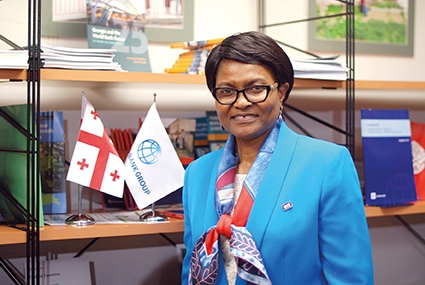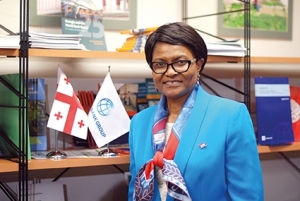The World Bank’s Mercy Tembon Gives an Exclusive Farewell Interview
Exclusive Interview
Mercy Tembon came to Georgia in October 2015 to begin her assignment as the Regional Director for the South Caucasus, which includes Armenia, Azerbaijan and Georgia. In this function she has been responsible for leading the dialogue and development of the World Bank’s Country Partnership program, managing the portfolio of projects and technical assistance, coordinating with other development partners and engaging key stakeholders on economic growth and poverty reduction issues in the South Caucasus. Her tour of duty ends on June 30 and she will be moving to the South Asia Region as the World Bank Director for Bangladesh and Bhutan.
“I will surely miss Georgia and its people, but I am taking with me many memories, lessons and experiences” she told GEORGIA TODAY in an exclusive interview.
What were your impressions of Georgia when you first arrived?
My impressions were, overall, positive. From a personal perspective, I will always remember how I felt on the first day of arrival in Tbilisi. I was mesmerized by the Caucasus mountain range, the combination of modern and ancient buildings and infrastructure in Tbilisi, such as the Peace Bridge, the cable cars in the air and centuries old churches. I was also amazed by the beauty of Tbilisi at night, with sparking lights all around, especially when viewed from the Funicular. The cocktail of old and new, Asian and European influences, the Georgian cuisine and wine captivated me upon my arrival.
From a professional perspective, I was impressed by Georgia’s economic performance - robust growth averaging 5% annually in the last decade. I was also impressed by the record of prudent reforms that had led to strong performance on macro-fiscal management, monetary policy as well as the banking sector. However, I also saw challenges and the need to sustain the course on reforms in priority areas. Georgia’s small open economy and its specific geographical location and features renders it vulnerable to external shocks and regional challenges. Furthermore, Georgia’s population is aging and shrinking, declining from 5 million at the time of independence to 3.7 million today. This phenomenon undoubtedly reduces opportunities for growth. So, from the very beginning I saw the strategic role of the World Bank Group to partner with the Government and other key stakeholders to think through solutions to these challenges.
What have some of the highlights been of your work and time here?
My time in Georgia has been very productive and fulfilling. Over the past four years I have traveled the length and breadth of the country on project site visits, talking to people and seeing for myself the results and impact we are making to improve their lives. I leave this country with a strong conviction that World Bank supported projects have significantly contributed to making Georgia more inclusive, connected, competitive and innovative.
A key highlight of my tenure is the increased focus on education and the quality of human capital, as a strategic priority for Georgia. We have supported the Government’s commitment and drive to invest in its people and build a strong foundation for promoting the competitiveness and prosperity of all the people. I visited schools, talked to students, teachers and parents, and there is unanimous agreement that quality education is key to the future development of the country.
Another highlight is the impact that our infrastructure investments have made in Georgia. Investments in municipal infrastructure and service delivery have fostered inclusive growth and given people opportunities to participate in the economy. For example, the rehabilitation of Telavi and its main highlight Erekle Castle (Batonistsikhe) is attracting millions of tourists to the Kakheti region. Similar effects are being felt in Imereti, Mtskheta-Mtianeti, and Samtskhe-Javakheti regions where we improved the quality of local infrastructure and promoted cultural heritage preservation and sustainable tourism that created job opportunities for many people. Investments in the construction of the East-West-Highway and secondary roads increased Georgia’s connectivity, reduced travel times for users and enabled farmers to get their produce to the markets faster.
A third highlight is the impact we have made in promoting innovation in Georgia. By providing financial support and a variety of value-added services, Georgia’s Innovation & Technology Agency (GITA) has been the foundation in building technology centers, and an ecosystem for small and medium enterprises (SMEs) to accelerate growth and commercialize new technology. Launched in 2014, with support from the World Bank, GITA started as an agency seeking to establish itself as the cornerstone of Georgia’s National Innovation Ecosystem and has piloted several programs with the goal to grow innovation within the technology sector as well as traditional sectors. Today, GITA is a leading source of early stage financing and mentoring for innovative firms, through its existing programs. These include GITA’s business incubator grants of GEL 5,000 (received by 52 individuals and 19 teams to date), the highly competitive mini grants, received by 17 out 150 applicants for a total of GEL 750,000, and micro grants, received by over 170 individuals for a total of GEL 522,000.
What would you note as areas where Georgia needs to develop further, and what advice would you give to the relevant authorities?
Overall, Georgia has performed well in all the sectors. However, there is always room for improvement. One area I would like to highlight is the need for Georgia to continue to develop the private sector to produce more and better jobs. Georgia needs to continue expanding business access to social and economic infrastructure, ‘hard’ infrastructure (transport, telecommunications, water, power systems, and fixed assets needed to provide education, health and sanitation) and ‘soft’ infrastructure (legal and regulatory frameworks, payments clearance and settlement systems, financial intermediaries and capital markets, collateral registries, credit rating agencies, and skills development) in order to enable productive individuals and productive firms. This requires levelling the playing field to enable all citizens to improve the quality of their human capital, namely through better education and better health. I am proud that the World Bank with the Government have spearheaded the Human Capital Project that focuses on improving education quality and skills, starting from the foundation stages in preschool to higher educational institutions. This is a surefire way to eliminate the social, economic and structural/spatial barriers to employment opportunities.
Minister Matchavariani said "the World Bank will continue collaboration with Georgia regarding infrastructure, particularly the power engineering sector." Can you tell us more?
The World Bank Group has been a long-term partner in the energy sector in Georgia to improve the country’s energy supply and reliability. In the last four years, we have completed the construction of transmission lines connecting an additional 180 MW of clean hydropower generation to the grid and have improved the reliability of power supply to the Ajara region. What I am equally proud of is our engagement in providing technical assistance to enable the government to make informed decisions about the fiscal costs and tariff impacts of current and future Power Purchase Agreements (PPAs). We will continue to support the government’s efforts in such a critical sector to the development of the country.
How do you see improvements, failings and focus areas for education reform in Georgia? What is the World Bank's involvement?
I must say that the World Bank has been supporting education reforms in Georgia for a long time and there have been tremendous improvements in the system in terms of provision and access. However, many challenges remain in terms of quality and performance. Georgia remains behind countries with similar per capita income in learning outcomes. Moreover, there are substantial in-country differences in performance, which are determined by location, socioeconomic status, and the availability of school resources. The existing public financing model of higher education does not lend itself to quality teaching and is not linked to the demands of the labor market in terms of skills development.
The Government of Georgia has made the strategic move to implement the needed reforms and changes on attitudes and educational approaches that will create a new foundation and generation of human capital akin to the best examples from the USA and the EU. This will require sustained reforms in the education sector that the World Bank will be supporting through our “Georgia I2Q Project – Innovation, Inclusion and Quality.” These investments will be accompanied by a Development Policy Operation (DPO) 2020, currently under discussion, which will include key policy triggers to be supported within the education sector. The Georgian government has been long aware that the country risks marginalization in a competitive global knowledge economy if its education system is not able to equip learners with the skills they need in the 21st century.
What is your 'take-away' from your experiences in Georgia?
The main take-away for me is that “where there's a will, there's a way.” While I have always cherished this proverb, I have come to see it in full fruition in Georgia. The willpower and ingenuity of Georgians have earned them a reputation as “star reformers” and has led to an outstanding record in improving governance and the business environment through far-reaching reforms. The country has maintained macroeconomic and fiscal stability over the years with its economy growing on average 5% over the last decade. This has led to job creation and poverty reduction.
My second take-away is that in every country, there are cultural and historic background differences, there are political, religious and social circumstances. Therefore, listening carefully, working closely with all stakeholders and being swift and responsive is a prerequisite for successful cooperation and production of impactful results for the people.
What would you say in your "goodbye message" to the Georgian people?
First, I am grateful for the opportunity to have lived and worked in Georgia, and I will have fond memories and a sense of accomplishment when I look back on this time in my life. Georgians can also be very proud of their achievements. They have helped their country to come a long way and made sure their future is full of opportunities. I really hope the country will continue to emphasize human capital as a way to inspire and empower the young people. I met with preschoolers, students, and young entrepreneurs and I saw their energy, creativity, and dedication. investing in their skills will ensure a future of prosperity for all Georgians. With a skilled workforce adapting to new markets and connected to the world, I see a bright future for Georgia. I strongly believe that Georgians have what it takes to be a prosperous country, possibly assisting other countries in future and continue to set an example for others to follow.
I wish to refer to a line from Ilia Chavchavadze’s, poem ‘Lines to the Georgian mother,’ written on December 15, 1858. “ჩვენ უნდა ვსდიოთ ეხლა სხვა ვარსკვლავს” (“We shall now chase a new star”). I would like to put the sentiment of this quote in my own words: “Keep raising the bar and continue to chase newer stars!” Nakhvamdis!
By Katie Ruth Davies











